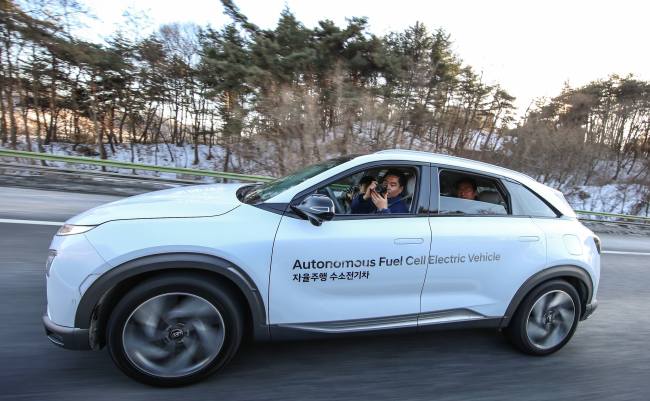Hyundai Motor successfully demonstrated its self-driving technology through its next generation fuel cell electric vehicle Nexo and luxury sedan Genesis G80 from Seoul to PyeongChang, the company said Sunday.
Marking the first-ever autonomous driving demonstrated on a hydrogen fuel cell vehicle, three units of Nexo alongside two units of Genesis G80 equipped with level four automation were used for last week’s test drive.
There are five levels of self-driving with five being fully autonomous which does not require any human interruption, according to standards established by the US National Highway Traffic Safety Administration.
“There have been test drives conducted at low speeds in selected areas on the highway. But this is first time that a carmaker has demonstrated long-distance self-driving at high speeds (between 100 and 110 kilometers per hour) of FCEVs,” Hyundai Motor said.
 |
Hyundai Motor officials riding hands-free on Nexo FCEV. (Hyundai Motor) |
Hyundai Motor unveiled Nexo FCEV last month at the Consumer Electronics Show in Las Vegas, touting it as the “ultimate future” with zero-emissions.
The carmaker also emphasized the long range and short charging time of FCEVs compared to pure electric vehicles.
On a five minute full charge, Nexo FCEV has a driving distance of over 590 kilometers, the company said.
The latest 190 kilometer-long test drive started at a rest area on Gyeongbu Expressway in Seoul until Daegwallyeong toll gate, Gangwon Province.
By pressing the “cruise” and “set” buttons on the steering wheel, the vehicles instantly operated on self-driving mode, the company said.
When necessary, they outpaced cars moving too slowly and changed lanes, and passed through seven tunnels, two toll gates, an interchange and a junction.
Despite the downsides of hydrogen fuel cell vehicles, such as the expensive price and bulky hydrogen tank, Hyundai has been introducing the green car as the most suited for autonomous driving due to its ability to process large amounts of data on self-produced electricity.
Nexo can even purify fine dust with the high-performance air filter, they added.
According to global service company KPMG’s report released last month, FCEVs are projected to account for one in four vehicles worldwide in 2040, totaling 35 million units.
As part of the government’s plans to foster future businesses, President Moon Jae-in on Friday tested the passenger‘s seat to experience Nexo’s level four automation.
With Lee Jin-woo, the head of Hyundai Motor’s Intelligent Safety Technology Center, sitting in the back seat, Moon rode Nexo FCEV on self-driving mode for 10 kilometers from a rest area in Yangjae-dong, southern Seoul to Pangyo interchange, Gyeonggi Province for 15 minutes.
“I could see for myself the world-class performance of (Korea’s) hydrogen fuel cell cars and fully automated driving,” Moon said after the test drive.
“Korea has all the skills in information technology, mobile communication, batteries and so on to lead the future auto industry. Zero-emissions electric and hydrogen fuel cell cars will also be an outstanding solution for pollution and fine dust.“
Hyundai Motor will further promote its latest FCEV at the upcoming PyeongChang Winter Olympics, before launching it here next month, the company said.
By Kim Bo-gyung (
lisakim425@heraldcorp.com)







![[Robert Fouser] Accepting migrants in South Korea](http://res.heraldm.com/phpwas/restmb_idxmake.php?idx=644&simg=/content/image/2024/10/31/20241031050896_0.jpg)
